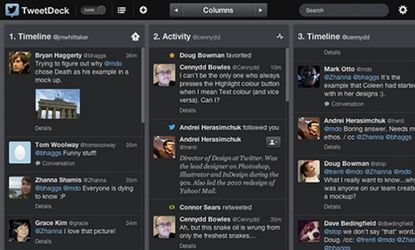Why Twitter is killing TweetDeck
And what you should replace it with

TweetDeck, the beloved Twitter client acquired by the social media giant in 2011, is unceremoniously getting the ax. In a blog post late Monday, TweetDeck announced that it was discontinuing support for its smartphone apps and for its dedicated desktop app, TweetDeck AIR. Instead, TweetDeck will refocus its efforts on browser-based versions, specifically its dedicated web application and Chrome app.
In many ways, doubling down on the TweetDeck web experience and discontinuing our app support is a reflection of where our TweetDeck power-users are going. Over the past few years, we've seen a steady trend towards people using TweetDeck on their computers and Twitter on their mobile devices. This trend coincides with an increased investment in Twitter for iPhone and Twitter for Android — adding photo filters and other editing capabilities, revamping user profiles and enhancing search. That said, we know this applies to most of our users — not all of them. And for those of you who are inconvenienced by this shift, our sincere apologies. [TweetDeck]
Of course, hardcore users aren't happy; scores of Twitter elite erupted in protest when the news of TweetDeck's imminent demise broke late Monday:
The message from Twitter is clear as day: Web-based apps are the future. Whenever you're sitting down at a computer, Twitter's chirpy overlords want your eyeballs reading 140-character missives through a web browser. It's why Twitter for Mac hasn't been updated since summer 2011 and why TweetDeck's apps are being forced into an early retirement.
Subscribe to The Week
Escape your echo chamber. Get the facts behind the news, plus analysis from multiple perspectives.

Sign up for The Week's Free Newsletters
From our morning news briefing to a weekly Good News Newsletter, get the best of The Week delivered directly to your inbox.
From our morning news briefing to a weekly Good News Newsletter, get the best of The Week delivered directly to your inbox.
Back in TweetDeck's heyday — that is, before its $40 million acquisition — the Twitter universe was a far messier place. Third-party clients enlisting Twitter's open API became a hit because they added new functionality, like multiple columns, the ability to schedule tweets — basically, all the stuff Twitter couldn't do on its own.
Now hashtags are everywhere, Twitter is a household name, TweetDeck is under its umbrella, and the company's overlords are obsessed with streamlining what was once an incredibly fragmented user experience. As John Hermann at BuzzFeed notes, "It's easier for the company in almost every conceivable way: Updates are cross-platform, sponsored content behaves like it should, and interface changes don't require an app update." For Twitter, it's a healthy amputation; for Twitter's users, it's an added annoyance.
If you're looking for a worthy successor to TweetDeck, try looking into Falcon Pro for Android ($2), which CNET gave 4.5/5 stars, and Tweetbot for the iPhone ($3), which The Verge calls "the most highly acclaimed iOS client."
Desktop apps are a bit trickier. I really like Tweetbot for Mac, but its steep $20 price tag is hard to justify for most users. TweetDeck's Chrome app, on the other hand, is free and will continue to receive support from the Twitter mothership for the foreseeable future. The Week's resident social media ace Jessica Hullinger recommends using Hootsuite. The service is free and offers all the column-friendly goodness TweetDeck users love, plus some nifty extras for Twitter addicts, like the ability to generate analytics reports.
Sign up for Today's Best Articles in your inbox
A free daily email with the biggest news stories of the day – and the best features from TheWeek.com
Create an account with the same email registered to your subscription to unlock access.
-
 Today's political cartoons - April 17, 2024
Today's political cartoons - April 17, 2024Cartoons Wednesday's cartoons - political anxiety, jury sorting hat, and more
By The Week US Published
-
 Arid Gulf states hit with year's worth of rain
Arid Gulf states hit with year's worth of rainSpeed Read The historic flooding in Dubai is tied to climate change
By Peter Weber, The Week US Published
-
 USC under fire for canceling valedictorian speech
USC under fire for canceling valedictorian speechSpeed Read Citing safety concerns, the university canceled a pro-Palestinian student's speech
By Rafi Schwartz, The Week US Published